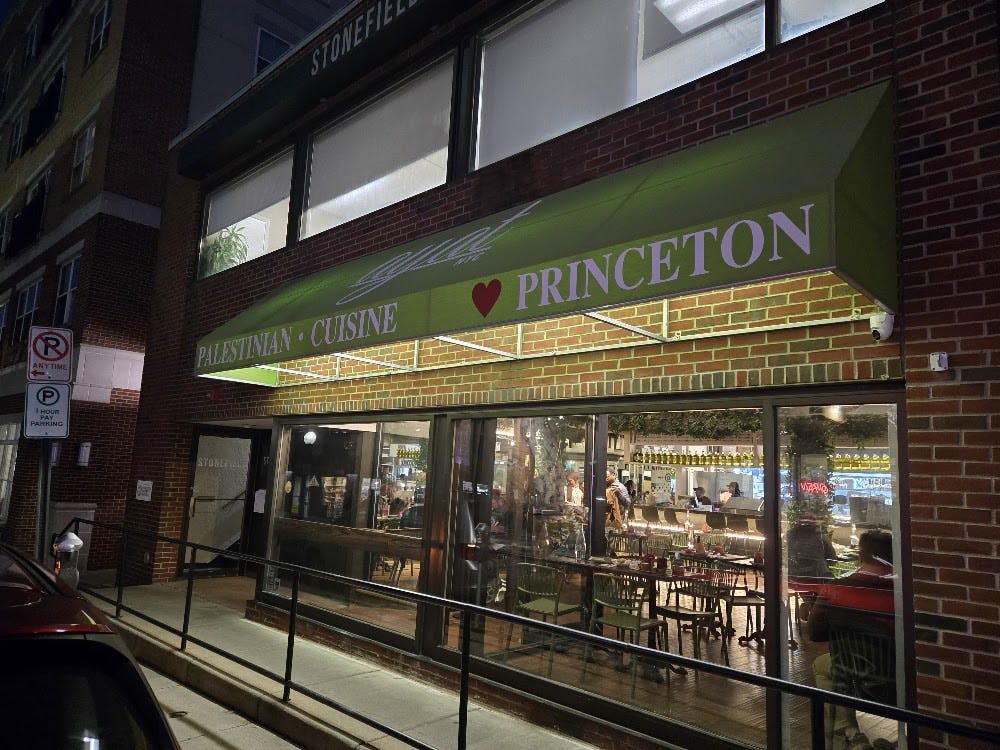The toasted, herbal smell of oregano, sumac, and thyme fills the air. Colorful dishes in rich shades of yellow, green, and red cover every table. A ceiling of greenery brings the outside in, and an open view into the kitchen promises fresh, made-to-order dishes in Princeton’s newest restaurant.
Another New York City restaurant has hit the streets of Princeton — Ayat, a slightly upscale Palestinian restaurant with a plethora of traditional dishes as well as American-fusion dishes. With five New York City locations as well as one in Allentown, Pa., Ayat’s latest outpost is located on Spring Street, where the all-vegan American comfort food restaurant Planted Plate used to be located. According to their website, Ayat’s cuisine and atmosphere find their roots in familial comfort and hospitality — an atmosphere so great that the restaurant earned the 74th spot on the New York Times’s Top 100 Restaurants in NYC.
To see if the Princeton location lives up to the fame of its New York counterparts, I visited Ayat on a cool Friday evening.

Indoor dining area of Ayat.
Lulu Pettit / The Daily Princetonian
I arrived with my group before the dinner rush around 5:30 p.m. and was seated right away. Although the restaurant is relatively small, a full-wall mirror made the space feel expansive and open. We were immediately served steaming hot pita along with olives, olive oil, and za’atar, a seasoning spice common in Middle Eastern cooking that usually contains a mix of toasted sesame seeds, dried sumac, oregano, thyme, and sometimes marjoram. Ayat’s blend tasted woody and nutty with a strong oregano presence balanced by the other herbs. The pita had just the slightest crisp on the outside, while the inside was soft and fluffy.
The menu has a wide selection of both appetizers and entrees. Some are more traditional Palestinian dishes like fattat lahma, a six-layer dish with lamb, rice, chickpeas, and more, as well as kebabs, shawarma, and dips like baba ghanoush. The restaurant also offers American-fusion options like their wood-fired pizzas, including options like “pizzawarma,” which features shawarma meat and halloumi cheese as toppings, and “falafel frenzy.”
We ordered tabbouleh, hummus, and falafel with tahini sauce. Less than ten minutes after ordering, our appetizers arrived. The tabbouleh — a mixture of parsley, fine bulgur, tomatoes, onions, olive oil, and lemon — was bright and fresh, balancing out the deeper, richer flavors of the other appetizers. The falafel was super crispy on the outside while still soft and herby on the inside. Dipped in the nutty tahini sauce, it was absolute perfection. Next to such strong appetizers, the hummus held its own, with a subtle lemony undertone and a dash of paprika on top to complement the silky smooth and salty dip.
About 20 minutes later, our entrees arrived. By this time, it was almost 6 p.m., so every table in the restaurant was taken, and there was a line out the door. For my entree, I ordered a small chicken kebab. My plate came with a heaping portion of moist and flavorful turmeric rice, spring salad mix with balsamic vinaigrette, small pieces of grilled chicken colored orange with seasoning, and a small bowl of yogurt sauce to tie it all together.


Entree of chicken kebab platter.
Lulu Pettit / The Daily Princetonian
While there was certainly enough food on the plate to constitute a meal, I noticed right away that there were only a few pieces of chicken. Considering I paid less than $16 though, there was plenty of food for its price. The chicken was juicy and had a warm, spiced flavor that made up for its small portion. The star of the dish was the yogurt sauce, which was tangy and brought a bright, fresh flavor.
At the end of the night, we ordered two desserts and Arabian coffee for the table. The dessert menu was surprisingly extensive but had a few items that didn’t fit with the Palestinian theme, like tres leches cake and Nutella cheesecake. However, there were also more traditional options, such as basbousa, a cake made from semolina, as well as the desserts my table ordered: baklava and kanafa.
Kanafa is akawi cheese that is first coated in crispy flakes of semolina dough and crushed pistachio and drenched in a sweet, honey-like syrup. The kanafa was a masterpiece — the golden semolina dough and syrup were balanced by the nutty topping and the mild but salty cheese, which was soft and stretchy. The baklava, on the other hand, had a crisp and flaky texture that practically melted in our mouths due to the amount of syrup it was soaked in. While the crushed walnuts inside and pistachio topping balanced the sweetness, it was complemented more so by the coffee. It was served in a traditional Arabian coffee pot with tiny teacups for each person. Unlike American coffee, the grounds are left in the pot along with cardamom. While I couldn’t taste the cardamom directly, it cut the bitterness of the strong coffee.


The baklava dessert.
Lulu Pettit / The Daily Princetonian
Ayat is now the third NYC-based chain to come to Princeton — first came Mamoun’s Falafel, which is currently celebrating the tenth anniversary of its Witherspoon St. location; then came Maman in November 2022. This trend makes me wonder: what other NYC staples might we see coming in the next few years? Could a Levain Bakery or a Joe’s Pizza appear? Or maybe Xi’an Famous Foods?
Regardless, Ayat ensures the future of the Princeton dining scene is bright. With its warm, friendly atmosphere and delicious menu, Ayat is a welcome addition to the food scene in town.
Lulu Pettit is a member of the Class of 2027 and a staff writer for The Prospect from the suburbs of Philadelphia. She can be reached at lp3153[at]princeton.edu or her Instagram @itslulupettit.








